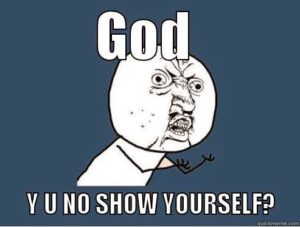I just finished watching Dr. William Lane Craig’s Defenders 3 videos on Natural Theology. I watched the videos where he dealt with the divine hiddenness objection that atheists frequently bring up. You can watch these two videos here and here in order to find out what Craig had to say about divine hiddenness. I largely agree with everything he said. I agree that if God made His existence undeniable that it would not necessarily entail that everyone would place their saving faith in Him, which is what God is most concerned about (2 Peter 3:9, 1 Timothy 2:4). I think it’s very plausible to think that, like Satan and a third of the angels, some people would continue rebelling against God even if they were absolutely certain that Christianity is true. We have plenty of examples of this in scripture. Even before I learned of how William Lane Craig responds to the divine hiddeness objection, this was the answer that I often gave. In fact, this was the answer I gave a few years ago in my blog post “Why Does God Hide Himself?”
However, after watching the videos, after hearing Craig’s answers, I had some questions pop up in my mind that I wasn’t sure how to answer. It’s plausible (and I would even say probable) to think that not everyone would repent and be saved if they just knew that God existed, but what about people who would repent? We know that there are people like this in the actual world. Think of people like C.S Lewis and Lee Strobel, who converted to Christianity once they investigated the evidence and came to the conclusion that Christianity is true. I think we could ask why God didn’t do something spectacular in the lives of these individuals to get them saved, since He clearly knew that they would submit to Him if they simply had enough evidence. In other words, my question is: Why did God use philosophical arguments and historical evidence to lead them to belief rather than some theophany? Why did God use evidence from science, history, and philosophy to persuade these people rather than simply appear to them in a way like how Jesus appeared to Paul if He knew that they would place saving faith in Him once they were convinced?
I think this would make sense on the view that if God made Himself too obvious, He would override peoples’ freedom to choose, and people would be coerced into being saved, which is the view that thinkers like Blaise Pascal, C.S Lewis, and J.P Moreland endorsed, but this doesn’t seem to make sense on the argument William Lane Craig endorsed. Craig and I both believe that it’s plausible to think that even if people knew that God existed, that wouldn’t necessarily prompt saving faith in Him. A lot of people would be just like the demons, having belief that God exists, but not having a saving relationship with Him (James 2:19, Revelation 20:10). But on the view that God has to keep His presence in a delicate balance between being evident enough so that we could know He was there, but hidden enough so as not to overwhelm our freedom, it would make sense why God would use rational argumentation (i.e natural theology and the historical argument for Jesus’ resurrection) to persuade people like Lewis and Strobel, rather than choosing to appear to them in a theophany or some other extravagant display. Arguments would be good enough for assent, but wouldn’t overwhelm us.
My question was why God doesn’t make Himself obvious to people who would go into a saving relationship with Him if they knew He existed.
I submitted this question to Dr. Craig’s Q and A session to see what he thought about this, but shortly after I submitted it, I found a plausible solution on my own. Could we perhaps say that God would indeed overwhelm some people if He made Himself too obvious, but that others would be unmoved? This would be to say that some would be coerced and others just would continue to shake their fist at Him. This would be to say that nobody would benefit from God being overwhelmingly obvious.
For people who would be saved if they only had reasons to believe God existed, these people would be overwhelmed, and thus they would come into a saving relationship with God out of coercion. Therefore, God keeps His existence in a delicate balance between being evident enough so that we know He’s there (and also making unbelief inexcusable), but being hidden enough so that we have the ability to talk ourselves out of the conclusions of the arguments for God. However, as for extremely hardened people who wouldn’t repent even if they knew that God existed, then God’s obviousness wouldn’t coerce them into a saving relationship with Him, that is to say that it wouldn’t help them either.
On this view which combines the answers that Craig and I usually give with the answers that Moreland and others often give, divine hiddeness makes perfect sense. The evidence is sufficient so that we know He’s there, but not overwhelming so that a good many of us aren’t coerced into salvation. Obviousness would hurt the elect and wouldn’t help the non-elect. Obviousness would prevent many people from freely loving God, and it wouldn’t make any difference for the hard hearted. This seems like a plausible solution to me.
To summarize: God’s not overwhelmingly obvious because it would (1) overwhelm people into coming to Him, in which case they would not be doing so freely, (2) there would be some, perhaps, many people who would not repent even if they were knew beyond a shadow of a doubt that God exists. It’s not either/or as I once thought. It’s probably both!
By the way, for my atheist readers who might be shaking their heads at the parts of this blog post where I say the evidence is sufficient, I advise you to investigate the articles on the evidence for God’s existence in the “Arguments For God’s Existence” section of this website, and I especially advise you to read my new book Inference To The One True God: Why I Believe In Jesus Instead Of Other Gods where I defend several arguments for the existence of the God of The Bible. This book will be available this week on Amazon.com.




